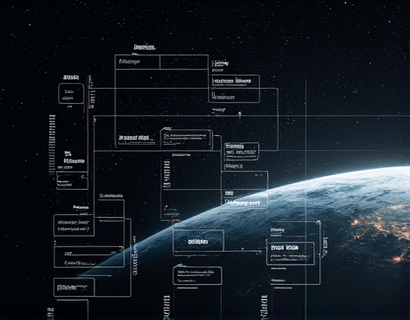Maximizing Civic Engagement: Leveraging Real-Time Data for Transparent Governance
In the digital age, the intersection of technology and governance has opened new avenues for civic engagement. Real-time data access stands as a pivotal tool in transforming how governments operate and how citizens participate in the democratic process. This article delves into the transformative power of real-time data in governance, highlighting how open data initiatives can drive informed citizen participation and enhance accountability in democratic processes. By making government information readily available and accessible, these initiatives empower citizens to engage more deeply, fostering a collaborative and accountable government.
The Importance of Transparency in Governance
Transparency is the cornerstone of trust in any democratic system. When government operations are open and accessible, citizens can better understand how decisions are made and how public resources are utilized. Real-time data plays a crucial role in achieving this transparency. It ensures that information is not only available but also up-to-date, allowing citizens to monitor government activities in real time. This immediacy is vital for maintaining public trust and ensuring that government actions align with citizen expectations and needs.
Real-Time Data: A Game Changer for Civic Engagement
Real-time data revolutionizes civic engagement by providing citizens with immediate insights into government operations. This access to timely information enables citizens to respond quickly to emerging issues, participate in discussions, and hold officials accountable. For instance, real-time data on budget allocations can help citizens track how public funds are being spent, fostering a more informed and engaged electorate. Similarly, real-time updates on policy implementations can facilitate public feedback and suggestions, making the policy-making process more responsive and inclusive.
Enhancing Accountability Through Open Data
Open data initiatives are instrumental in enhancing government accountability. By making data freely available to the public, governments can demonstrate their commitment to transparency and responsible stewardship of public resources. Real-time data further amplifies this effect by ensuring that the information is current and relevant. Citizens can use this data to monitor government performance, identify inefficiencies, and advocate for improvements. This level of accountability is crucial for building a trustworthy and effective government.
Real-Time Government Data: Revolutionizing Civic Engagement
The availability of real-time government data has the potential to transform civic engagement in several ways. First, it democratizes access to information, leveling the playing field for all citizens regardless of their background or resources. No longer do citizens rely solely on periodic reports or selective media coverage; they can now access the latest data directly from government sources. This direct access empowers citizens to make informed decisions and participate more actively in the democratic process.
Second, real-time data facilitates more meaningful public discussions and debates. When citizens have access to the latest information, they can engage in more informed and constructive dialogues about policy issues. This can lead to more nuanced understanding and better-informed opinions, ultimately enriching the democratic discourse. Moreover, real-time data can be used to create interactive platforms where citizens can visualize and analyze government data, fostering a deeper understanding of complex issues.
Case Studies: Successful Real-Time Data Initiatives
Several cities and countries have successfully implemented real-time data initiatives that have significantly enhanced civic engagement. For example, New York City's OpenDataNYC platform provides a comprehensive repository of city data, covering areas such as budget, transportation, and public safety. Citizens can explore this data through interactive maps and charts, gaining insights into various aspects of city governance. This transparency has led to increased public participation in city planning and policy discussions.
Another notable example is the city of Barcelona, which has embraced open data to improve citizen services and engagement. The city's data portal offers real-time information on public transportation, waste management, and environmental quality. These data insights have not only improved service delivery but also encouraged citizen-led projects and innovations. For instance, developers have created apps that use real-time data to help residents find the nearest recycling bins or track the performance of local schools.
Challenges and Solutions in Implementing Real-Time Data Initiatives
While the benefits of real-time data in governance are clear, implementing such initiatives comes with its own set of challenges. One major challenge is the technical infrastructure required to collect, process, and disseminate data in real time. Governments need to invest in robust IT systems and ensure data quality and security. Additionally, there is a need for skilled personnel to manage and maintain these systems, which can be resource-intensive.
To overcome these challenges, governments can collaborate with tech companies and academic institutions to leverage their expertise and resources. Public-private partnerships can help in developing scalable and secure data platforms. Moreover, training programs can be established to upskill government employees in data management and analysis. Open-source tools and platforms can also be utilized to reduce costs and promote transparency in the development process.
Building a Culture of Transparency and Participation
Creating a culture of transparency and participation requires more than just providing real-time data. It involves fostering a mindset where openness and citizen engagement are valued and prioritized. Governments should actively promote the use of real-time data through public awareness campaigns and educational programs. Workshops and training sessions can help citizens understand how to access and utilize government data effectively.
Furthermore, feedback mechanisms should be established to ensure that citizen input is heard and considered in policy-making. Online forums, social media platforms, and citizen advisory boards can serve as channels for ongoing dialogue between the government and the public. By actively involving citizens in the decision-making process, governments can build a more inclusive and responsive democratic system.
The Future of Real-Time Data in Governance
The future of real-time data in governance holds immense potential for further enhancing civic engagement and transparency. As technology continues to advance, the capabilities for data collection, analysis, and dissemination will become even more sophisticated. Artificial intelligence and machine learning can be leveraged to provide deeper insights and predictive analytics, helping governments anticipate and address citizen needs proactively.
Moreover, the integration of real-time data with other technologies, such as blockchain, can enhance data integrity and security. Blockchain's decentralized and immutable nature can ensure that government data remains tamper-proof and transparent. This combination of technologies can create a more robust and trustworthy framework for real-time governance.
Conclusion
Real-time data access is a transformative force in modern governance, driving informed citizen participation and enhancing accountability. By embracing open data initiatives, governments can foster a more transparent and collaborative relationship with their citizens. The success of real-time data initiatives depends on technical infrastructure, public engagement, and a commitment to transparency. As we move forward, the integration of advanced technologies will further amplify the impact of real-time data, paving the way for a more participatory and responsive democracy.










































